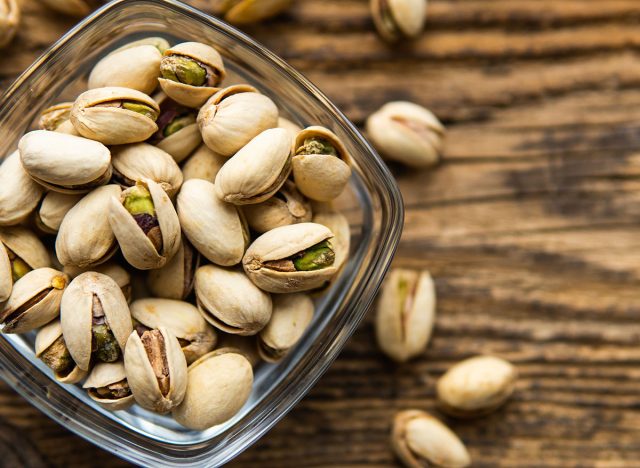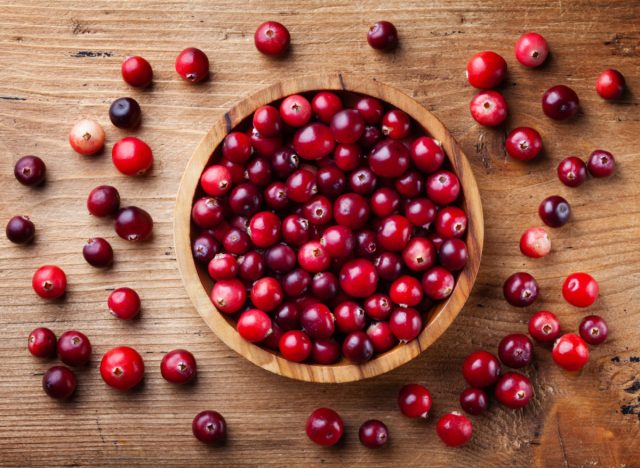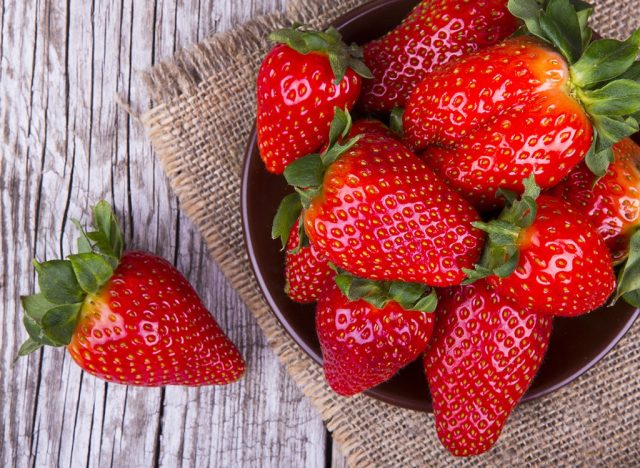Aging can be a beautiful thing, and it is ultimately something we can be grateful for as proof that we get to live another day. But, let's fact it—some days, getting older can be a real drag. Your body undergoes many types of changes, both externally and internally, and this can be a frustrating experience, especially because aging can be a risk factor for many different diseases. Thankfully, there are superfoods you can eat on a regular basis to help slow down this process.
"Superfood" is a term that gets thrown around quite often, but what does it actually mean? According to the Cleveland Clinic, there isn't a clear way of determining what is and what isn't considered a superfood, but it is essentially anything that provides many different nutrients and stays on the lower end of calories. While superfoods are great to include in your diet at any time, there are specific choices that contain nutrients related to slowing down the aging process.
"Some of our nutritional needs can change as we age, so including some specific superfoods in your diet may help people live a healthy life as they get older," says Lauren Manaker, MS, RDN, registered dietitian and author of The First Time Mom's Pregnancy Cookbook and Fueling Male Fertility.
We were curious about what these specific superfoods would be, so we asked a couple of our experts to weigh in. And even though there are plenty of superfoods to help slow aging into your 50s, 60s, 70s, and beyond, we wanted to focus specifically on the years after you turn 40. For one, your 40s are the perfect time to start setting healthy habits so that you can take these changes into your later decades. Also, your body does start to undergo specific changes in your 40s, such as muscle mass loss, hormone changes related to menopause, and shifts in your height related to bone and muscle changes.
Pistachios

"Free radicals attack healthy body cells, and this damage is thought to contribute to inflammation and the build-up of oxidative stress," says Manaker. "Collectively, this can accelerate aging at the cellular level, while also playing a foundational role in promoting chronic health conditions, including heart disease and cancer. Health professionals recommend antioxidant-rich foods to help protect healthy cells from free radical damage in the body."
Thankfully, Manaker tells us that pistachios are known to help fight these free radicals by way of their antioxidant capabilities. "A study conducted by Cornell University and published in the journal Nutrients found that pistachios have a high-antioxidant capacity, with the antioxidant capacity of pistachios rivaling that of popular antioxidant-containing foods, including blueberries, pomegranates, etc."
"Data shows that eating just a handful of pistachios as part of a regular diet can positively affect cellular aging and longevity among those with pre-diabetes," adds Manaker. "And, pistachios also contain lutein, an antioxidant carotenoid that helps support eye health."
Salmon
Another wonderful superfood to help slow the process of aging is salmon, as well as many other types of fatty fish. "Salmon is an excellent source of lean protein, a nutrient important for maintaining muscle mass, and is especially important for older adults," says Lisa Young, PhD, RDN, author of Finally Full, Finally Slim and member of our Medical Expert Board. "It's also rich in omega-3 fatty acids, which can lower the risk of heart disease."
In fact, one study published in Neurology found that those in their 40s and 50s whose red blood cells contained higher levels of omega-3s had better cognitive functioning and overall brain structure than those who had lower omega-3 counts.
Cranberries

If you're a fan of cranberries, or cranberry juice, you're in luck, because this superfood has been found to help slow aging.
"Cranberries are packed with plant compounds that may help slow the aging process, especially when focusing on cognitive aging," says Manaker. "Data shows that consuming what is equivalent to one small cup of cranberries every day over a three-month period may improve memory performance and neural functioning."
On top of the cognitive-related benefits this fruit can offer you, "Cranberries are also a source of vitamin C, a nutrient that may help combat the effects of free radicals on aging skin," says Manaker.
Tomatoes
According to Young, tomatoes are an important superfood to help slow aging. "Certain red foods, such as tomatoes, contain the antioxidant lycopene, which fights free radicals that come with aging," she says. Lycopene, which is a plant compound found also in watermelon and pink grapefruit, is known for its multitude of health benefits.
High lycopene intake has been found to help lower cholesterol, improve cardiovascular health and help reduce risk of heart disease, help lower risk of stroke, and even help reduce the risk of prostate cancer in men. And, in addition to all of these benefits against age-related diseases, lycopene is known to help reduce skin photo damaging.
Strawberries

"Strawberries are a source of vitamin C and plant compounds," says Manaker.
According to research published in the Journal of Alzheimer's Disease, getting adequate vitamin C can help protect you against age-related cognitive decline. In fact, they go a step further by saying that making sure you're eating a balanced diet and getting vitamin C through your foods can be more effective than supplementing.
"Some data shows specifically that eating berries more than twice a week may delay cognitive aging by up to 2.5. years," says Manaker.
Young adds that "berries may also help protect our cells from free-radical damage and reduce the risk for heart disease and cancer, as well."
Dark green leafy greens
"Leafy greens such as kale and spinach are rich in vitamins E and K, which may prevent memory loss and help reduce how much our brain ages," says Young.
The research certainly backs this up as well. In a study published by the American Academy of Neurology, it was concluded that one serving of leafy greens a day was associated with less age-related cognitive decline.
But, the benefits of dark, leafy greens don't stop there. Not only do dark leafy greens help your cognitive health as you age, but according to Young, "These greens contain carotenoids, which may help protect the eyes against oxidative damage, and spinach specifically is also rich in antioxidants vitamins A and C, which can help protect the heart."
No comments:
Post a Comment